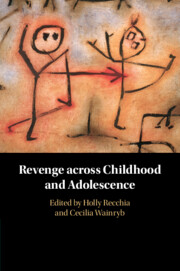Book contents
- Revenge across Childhood and Adolescence
- Revenge across Childhood and Adolescence
- Copyright page
- Dedication
- Contents
- Figures
- Tables
- Contributors
- Acknowledgments
- Chapter 1 And If You Wrong Us, Shall We Not Revenge?
- Chapter 2 A Framework for Understanding Variation in Youth Revenge Motivations and Retaliatory Behaviors
- Chapter 3 Normative Changes and Individual Differences in Retaliation Judgments
- Chapter 4 Developing Revenge in Early Childhood
- Chapter 5 Understanding Youths’ Retaliatory Experiences through the Lens of Moral Agency
- Chapter 6 Cultural Systems and the Development of Norms Governing Revenge and Retribution
- Chapter 7 Settling the Score in a Zero-Sum Game
- Chapter 8 Intergroup Processes
- Chapter 9 Revenge, Justice Systems, and Institutional Trust in Schools
- Chapter 10 The Importance of a Positive School Climate in Addressing Youth Retaliation
- Chapter 11 Socioemotional Competencies and Positive Classroom Climate as Alternatives to Prevent Revenge in Colombian Schools
- Chapter 12 Looking Back and Charting a Course
- Index
- References
Chapter 8 - Intergroup Processes
Revenge among Youth Living amid Protracted Conflict
Published online by Cambridge University Press: 08 July 2021
- Revenge across Childhood and Adolescence
- Revenge across Childhood and Adolescence
- Copyright page
- Dedication
- Contents
- Figures
- Tables
- Contributors
- Acknowledgments
- Chapter 1 And If You Wrong Us, Shall We Not Revenge?
- Chapter 2 A Framework for Understanding Variation in Youth Revenge Motivations and Retaliatory Behaviors
- Chapter 3 Normative Changes and Individual Differences in Retaliation Judgments
- Chapter 4 Developing Revenge in Early Childhood
- Chapter 5 Understanding Youths’ Retaliatory Experiences through the Lens of Moral Agency
- Chapter 6 Cultural Systems and the Development of Norms Governing Revenge and Retribution
- Chapter 7 Settling the Score in a Zero-Sum Game
- Chapter 8 Intergroup Processes
- Chapter 9 Revenge, Justice Systems, and Institutional Trust in Schools
- Chapter 10 The Importance of a Positive School Climate in Addressing Youth Retaliation
- Chapter 11 Socioemotional Competencies and Positive Classroom Climate as Alternatives to Prevent Revenge in Colombian Schools
- Chapter 12 Looking Back and Charting a Course
- Index
- References
Summary
This chapter applies a developmental approach to understand how intergroup processes shape the emergence of retaliatory motives and behaviors among youth growing up in contexts of protracted intergroup conflict, drawing on research examples from Israel-Palestine, Northern Ireland, and Vukovar, Croatia. Across these conflict-affected societies, reasoning around revenge may be influenced by both personal and collective victimization. As part of the cycle of violence, youth may be motivated to engage in tit-for-tat acts of retaliation through direct exposure to political violence, social identification with conflict-related groups and group norms. Family and broader societal processes may further reinforce desires for revenge by transmitting narratives of ethnic socialization and historic group suffering. Children and adolescents may display variation in intensities of retaliatory behaviors, such as aggression and discrimination, which can contribute to the maintenance of intergroup hostilities across generations. The chapter integrates learnings from the three cases and offers recommendations for peacebuilding interventions.
Keywords
- Type
- Chapter
- Information
- Revenge across Childhood and Adolescence , pp. 187 - 217Publisher: Cambridge University PressPrint publication year: 2021
References
- 1
- Cited by

